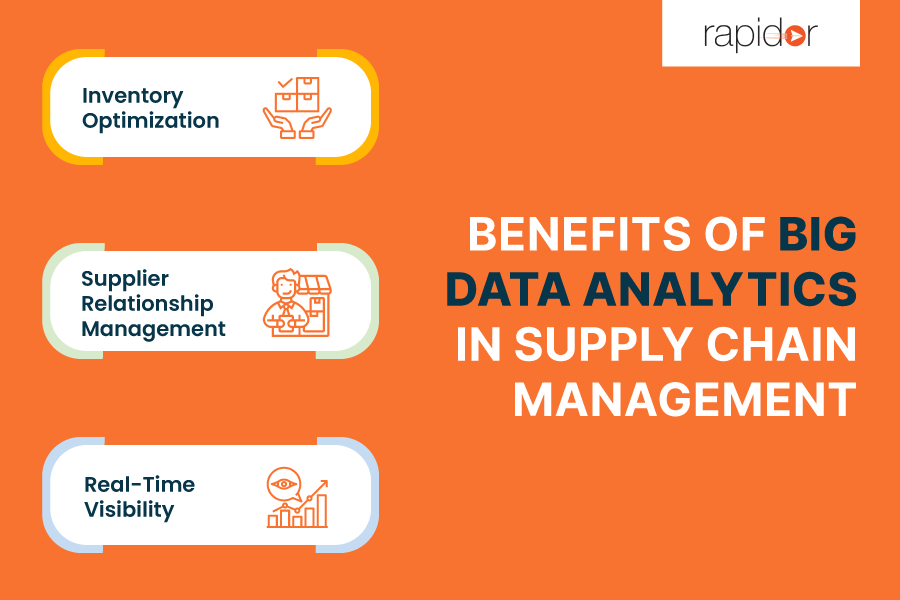In the age of information, big data analytics has emerged as a game-changer, transforming industries and reshaping business landscapes. One of the areas experiencing a profound impact is supply chain management. As supply chains become more intricate and global, the ability to extract actionable insights from vast data sets has become essential. This blog embarks on a journey through the realm of big data analytics in modern supply chains, uncovering its role in predicting trends, optimizing operations, and fostering innovation.
The Power of Big Data in Supply Chain Management
In an era where data is the new currency, supply chain professionals are harnessing the power of big data to revolutionize their operations. At the forefront of this transformation is the ability to predict supply chain trends, optimize resource allocation, and mitigate disruptions. By leveraging the immense volume of data generated throughout the supply chain, organizations gain insights that were previously unattainable.
Predicting Supply Chain Trends
Through big data analytics, supply chain professionals can analyse historical data to predict future trends. This empowers organizations to proactively adapt to changing market dynamics, optimize inventory levels, and adjust production schedules accordingly.
Demand Forecasting with Data Analytics
Data-driven demand forecasting takes the guesswork out of inventory management. By analysing customer behaviour, market trends, and external factors, organizations can optimize stock levels, prevent overstocking or stockouts, and enhance overall resource allocation.
Mitigating Supply Chain Disruptions
One of the most significant challenges in supply chain management is disruptions. Big data analytics acts as a radar, enabling organizations to identify potential disruptions in real-time. By detecting anomalies, organizations can take pre-emptive actions to ensure seamless operations.

Applications and Benefits
The applications of big data analytics in supply chain management are wide-ranging, offering tangible benefits that drive efficiency and innovation.
Inventory Optimization
Optimizing inventory levels is a delicate balancing act. Big data analytics provides the insights needed to strike that balance, ensuring that organizations have the right amount of inventory to meet demand while minimizing storage costs and waste.
Supplier Relationship Management
Data analytics strengthens supplier relationships by providing transparency and insights into supplier performance. This collaboration leads to better negotiation, improved communication, and more efficient collaboration throughout the supply chain.
Real-Time Visibility
Real-time data analytics offers end-to-end visibility into the supply chain. This visibility enables organizations to track shipments, monitor production, and respond swiftly to disruptions, enhancing operational efficiency and customer satisfaction.
Challenges and Considerations
While the benefits of big data analytics in supply chain management are substantial, there are challenges and considerations that must be addressed for successful implementation.
Data Quality and Integration
The accuracy of analytics outcomes hinges on the quality and integration of data. Ensuring that data is accurate, consistent, and integrated from various sources is crucial for meaningful insights.
Privacy and Security Concerns
Handling large volumes of data comes with privacy and security challenges. Protecting sensitive information and ensuring compliance with data protection regulations is paramount in big data analytics.
Real-World Case Studies
The success stories of organizations that have harnessed the power of big data in their supply chains provide a glimpse into the transformative potential of this technology.
Amazon: Dynamic Inventory Management
Amazon, the e-commerce giant, uses big data analytics to dynamically manage its inventory. By analysing customer behaviour, order history, and market trends, Amazon ensures that its warehouses are stocked with the right products, minimizing storage costs and optimizing customer satisfaction.
Walmart: Supply Chain Optimization
Walmart, a global retail leader, leverages big data analytics to optimize its supply chain operations. Through data-driven insights, Walmart enhances its demand forecasting, optimizes its distribution network, and improves inventory management, leading to efficient operations and reduced costs.
Future Trends and Outlook
As technology continues to evolve, big data analytics in supply chain management is poised for further innovation and advancement.
AI and Machine Learning Integration
The integration of artificial intelligence (AI) and machine learning (ML) with big data analytics holds the potential for more advanced insights. AI and ML algorithms can identify patterns, predict trends, and provide recommendations for strategic decision-making.
Sustainable Supply Chains
The role of big data in promoting sustainable supply chains is gaining prominence. Organizations can analyse data to track their environmental impact, optimize transportation routes, reduce waste, and make eco-friendly choices throughout the supply chain.
Conclusion
As the journey through the world of big data analytics in modern supply chains comes to an end, the power of data-driven insights is undeniable. The ability to predict trends, optimize operations, and drive innovation has ushered in a new era of supply chain management. From Amazon’s dynamic inventory management to Walmart’s supply chain optimization, real-world examples showcase the tangible impact of big data analytics.
Frequently Asked Questions
What is the role of big data analytics in supply chain optimization?
Big data analytics plays a pivotal role in supply chain optimization by providing insights into trends, demand forecasting, and disruptions. These insights empower organizations to make informed decisions, optimize inventory levels, and enhance overall operational efficiency.
How can organizations overcome challenges in implementing big data analytics in supply chains?
Organizations can overcome challenges by prioritizing data quality and integration to ensure accurate insights. Addressing privacy and security concerns through compliance with data protection regulations is essential. Partnering with experienced technology providers can also help navigate challenges effectively.
What are the future prospects of big data analytics in supply chain management?
The future prospects of big data analytics in supply chain management are promising. Integration with AI and machine learning is expected to provide advanced insights, while the role of big data in promoting sustainable supply chains aligns with the growing emphasis on eco-friendly practices.


